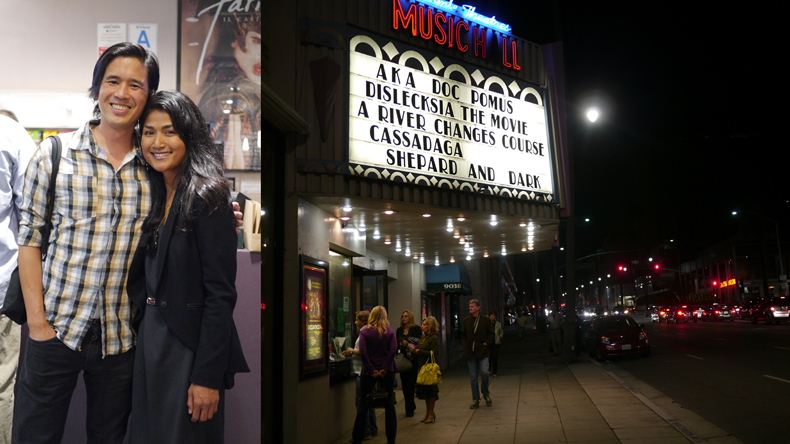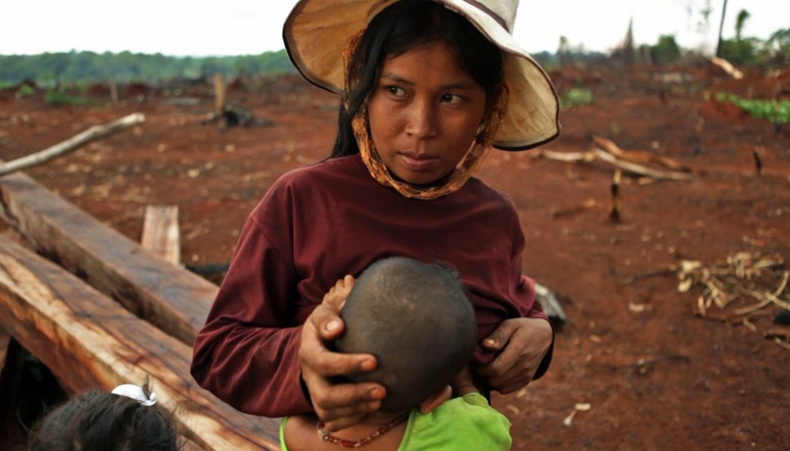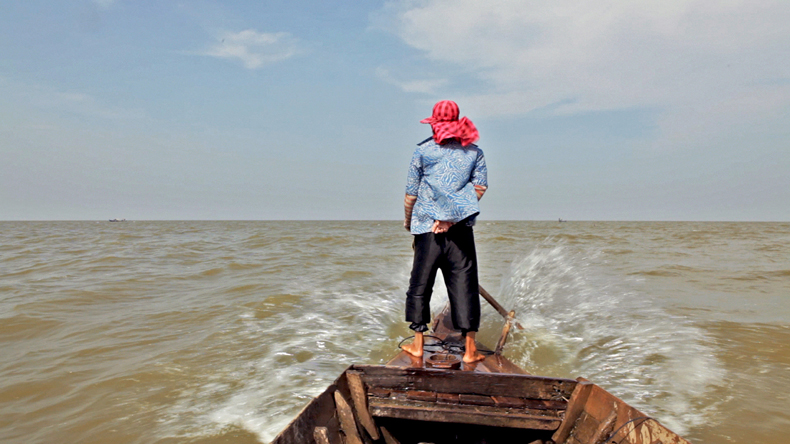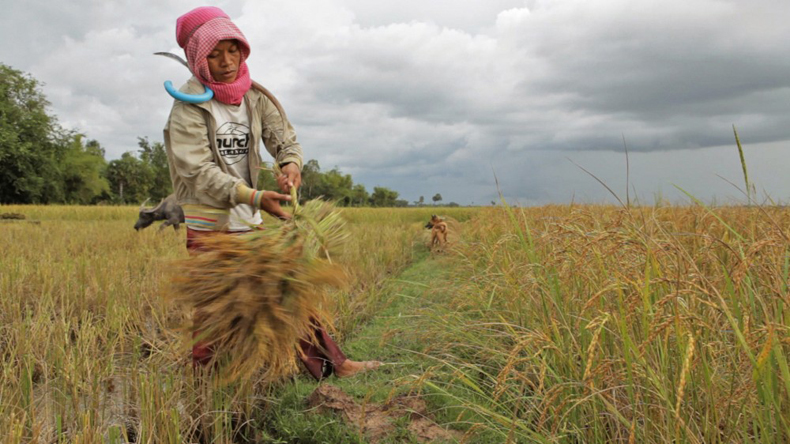Oct 15, 2013 After-screening Q&A with Kalyanee Mam (A River Changes Course)
If you even skim my blogs, you already know how highly I think of my friend Kalyanee Mam and A River Changes Course, her artful, contemplative, and powerful documentary about three families in Cambodia whose traditional ways of life are being destroyed by globalization and progress. The movie has been racking up awards and accolades in the film festival circuit, and is now experiencing a limited theatrical release. So when Kalyanee asked me to moderate a talk following Saturday night’s screening at the Laemmle Music Hall 3 in Beverly Hills, how could I say no? Any excuse to catch up with Kalyanee and see her gorgeous movie again.
Afterward, I transcribed and edited down the Q&A to share with you…
Your movie is amazing but I think your personal story is really interesting as well. Can you tell us about it?
I was born in Cambodia, where nearly 2 million people were killed between 1975 and 1979. My family and I fled the country in 1979 and we lived in refugee camps for about a year and a half to two years, and finally immigrated to the United States in 1981. Growing up, my parents instilled in us a strong sense of Cambodian identity so I always felt this urge to return to my country and learn more about my history and past.
The first time I went back to Cambodia was in 1998, and when I returned 10 years later I realized how the country was drastically changing. All the forests and jungles were being cut down. The rivers and lakes were being fished to extinction. There was a huge migration of women, especially, from the countrysides to the factories in the city. I realized that I need to document what was happening, and that’s what inspired me to make the film.
But I wasn’t a filmmaker yet. I was a lawyer and I was working as a consultant in Iraq. It was that work that led me to understand the situation with Iraqi refugees that were trying to flee the country and live in neighboring countries. That reminded me of my family’s own flight from our home country to the United States, and I decided the best way to document what was happening in Iraq and inform people about it was through film–even though I had no film experience. From that project I worked on Inside Job, a documentary about the global financial crisis. I worked as a cinematographer, associate producer, and researcher.
And then I produced, directed, and shot A River Changes Course.
So you’re a self-taught filmmaker.
I’ve never been to film school but I feel that when you’re passionate about something and want to expose something or inform people about something that’s happening, there’s really no hurdle or challenge too big. You just have to motivate yourself to do it. For me, there was no other choice but to work on these projects. Especially A River Changes Course. What is happening in Cambodia right now is incredible. The film tells the stories of three families but they are replicated a thousand times over in Cambodia and millions of times over all over the world. Displacement, globalization, and development are happening everywhere.
The movie’s footage ranges from 2008 to 2012. Four years is a long time! Did you ever feel overwhelmed?
It is a long time. I met Sari Math, the young boy, in 2008 but couldn’t start shooting the film until I finished working on Inside Job in 2010. Production was constant from 2010 to 2012. There was no time when I felt like it was too challenging, although it was definitely difficult to film in the jungles, live with the families on the lake or river, and get access to the factories. But none of the challenges were big compared to the story I was telling.
I’m guessing you weren’t dressed as formally as you are now when you were filming in Cambodia. Were you able to blend in? Did people trust you immediately?
Oh, it was amazing how the families welcomed me with open arms. Growing up, I always thought my family was unique and special because they were so nice and hospitable. But everyone in Cambodia is so wonderful and kind. I never had any problems. I started out with the three families and the way that I won their trust was opening myself up to them. I told the story of my family and shared photographs of my mother, sisters, and brothers, and, in doing so, they felt it was fine to share their stories also. Sharing stories with one another was a really important part of the process.
And during that time I grew a lot. I learned a lot about myself and how important relationships are. It was necessary for me to take three years to make this film because I built relationships and built trust. I wouldn’t feel right just going for a week. For me, I have to have close relationships with people in order to feel authentic. My wish has always been to show as authentically as possible my experiences with the families. Living with them, eating with them, and being with them–I wanted to share all that with all of you.
Were you by yourself or did you have a small crew?
It was me, our producer in Cambodia Ratanek Leng (who held the boom mic and external sound recorder), and our driver. We all lived with the families.
And you’d follow a subjects around on a fishing boat, for example?
No, no. We were on the boat with them. And you know that scene where the father is praying on the boat? It’s very small but fortunately all of us were small and fit on it. And my camera was a Canon 5D and three lenses, mainly the 28-70mm lens. That was it. Most of the shots were on a monopod. For the landscape shots I used a tripod. And then I used a Kessler Pocket Dolly for the dolly shots.
Did you put the camera in a Ziploc for the scenes in the rain and in the dirt?
No. There are all these rigs you can buy and stuff you can wear abut I was, like, forget it. You don’t need all that stuff. I wanted to be as intimate as possible with the families and didn’t want anything to get in the way.
I like how the movie starts off as purely observational but when words kick in, you realize that we Americans are contributing to the situation. Can you talk about local screenings at colleges and high schools?
Actually some high school students have been the most curious, inquisitive, and inspired by the film. They’re inspired by the issues and challenges that the families are faced with as well as the global issues. And also the act of being filmmaker and using film as a social action tool.
And what are some of the reactions you’ve been getting from audiences in Cambodia?
It’s been incredible. Our first screening in Cambodia was to 600 people at the largest theater in Phnom Penh. Two hundred were parents of garment factory workers who came from the villages and provinces. And the three families came from the jungle, river, and countryside and were amazed and shocked. They knew we were making movie but didn’t know the extent of it or how big the screen would be. After the screening during the Q&A session, instead of asking questions the general audience stood up and spoke about how they were affected and the specific way the film impacted them.
I could share a few stories from Cambodia but I’d rather talk about something that happened today. We had a screening at noon, and a young Cambodian woman she was moved because it was the story of her life. She had just came to the U.S. from Cambodia four years ago. She was a factory worker and her mother was a fisherwoman, and her challenges are the ones that all Cambodians face right now. Now she feels empowered and hopes to share her story.
That’s the response we’re getting in Cambodia, too. The film is helping to contribute to national identity building because it shows the stories of indigenous people and ethic people, and not just Cambodians. All these places are part of Cambodia and our history is not just mired in the Khmer Rouge. We are something different and we are the present as well.
I think it’s important to consider your larger body of work. You aren’t just a Cambodian filmmaker but someone who tells stories about people being crushed all over the world: Iraq, Wall Street, and even the South.
I have two projects in the works and the most recent one is about foster Lakota children who are being removed from their families and being placed in foster care facilities and homes against Federal law and the Indian Child Welfare Act. They’re also being medicated with psychiatric drugs and I’m trying to expose that. The other project is about Chinese investment in Africa.
I’m really interested in indigenous culture and people who are displaced from their lands and their homes because of war, conflict, development, and whatever the case may be.
I love how you take these unsavory subjects and give voices to people depressing situations but show them in a way that’s hopeful. And that combination of seriousness and cheerfulness is present even we’re just having lunch or something.
Thank you!
Visit the A River Changes Course website to find out more information and locate screenings near you.






